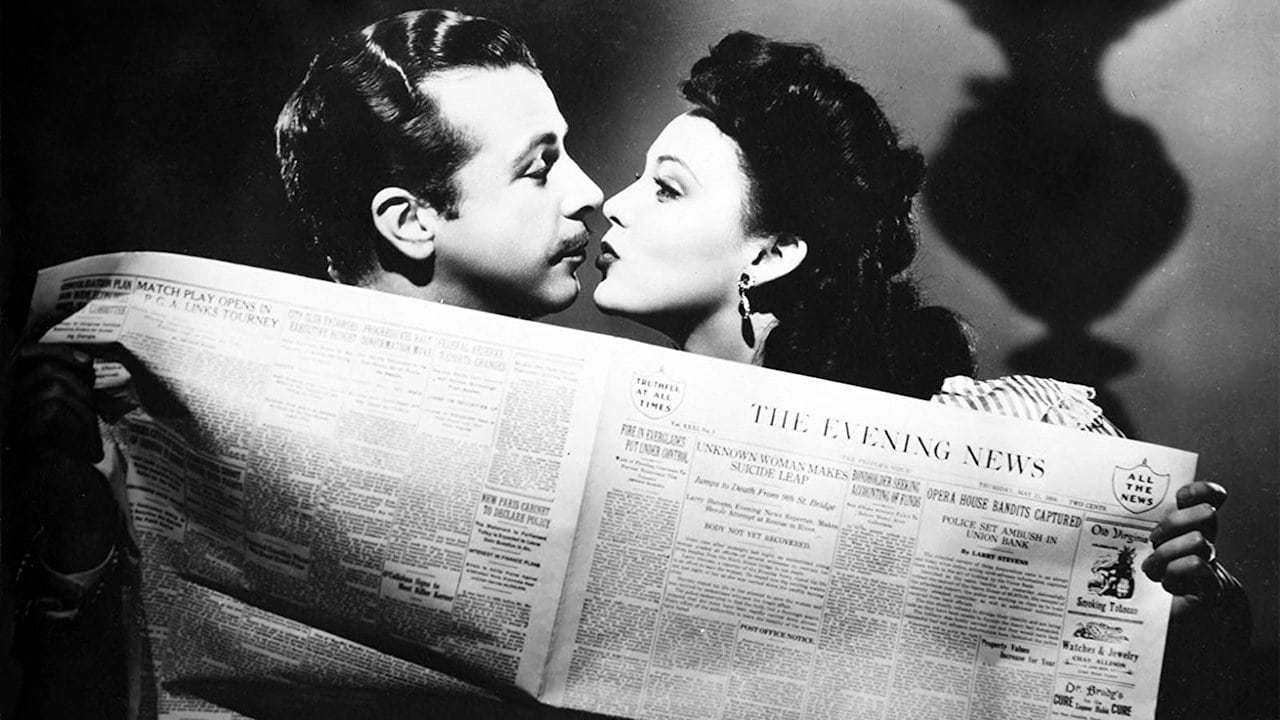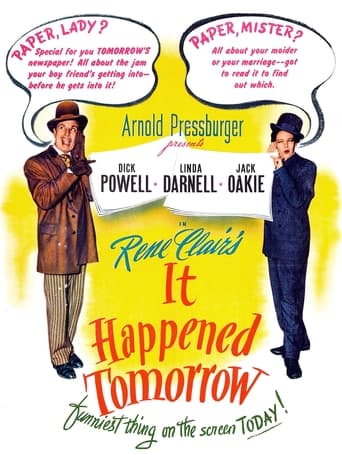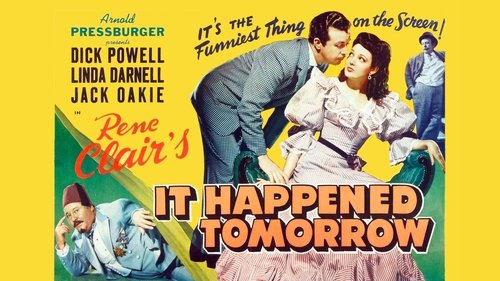




Well Deserved Praise
Very Cool!!!
Clever and entertaining enough to recommend even to members of the 1%
View MoreA terrific literary drama and character piece that shows how the process of creating art can be seen differently by those doing it and those looking at it from the outside.
View MoreI saw "It Happened Tomorrow" quite a long time ago when I was young and my memory of it was that it fell into the fantasy genre category, akin to a Twilight Zone episode. Having just seen it again at the ripe old age of fifty-eight, it's quite clear that the 'fantasy' element is probably the best aspect of the narrative, but truth be told, this film is primarily put together as a romantic comedy. It's a charming little film with a strong opening Act 1 and a very engaging Act 3 climax. It only falters during the long-winded second Act, where some of the comic digressions fall flat.'It Happened Tomorrow' is at its best when the reporter protagonist, Larry Stevens, charmingly played by Dick Powell, encounters 'Pop Benson', the mysterious old man (winningly played by John Philliber) who provides Larry with tomorrow's newspaper. Ironically, Philliber died the same year (1944) the movie was released. And here he plays a character (who we learn at the end of the film) has been handing Larry the newspapers after his purported death, shortly after offering up some enigmatic comments on the nature of time to Larry and his cronies down at the newspaper office.You'll notice that director Rene Clair doesn't have Larry discover right away, the fact that the first newspaper Pop has given him, is from one day in the future. He cleverly has Larry's acquaintance in the restaurant read the weather report, indicating unseasonal snow in May. Then Larry realizes just what Pop has given him when he looks through the restaurant window, and discovers indeed that the snowflakes are coming down in May. The acquaintance has been looking for a job and runs over to another restaurant only to find a female employee denying that her boss is looking for new help. The acquaintance stalks out, leaving Larry witness to the firing of a 'butter fingered' dishwasher, confirming that indeed the boss had placed a want ad in tomorrow's late edition.The next sequence is even more exciting. After making the acquaintance of love interest Sylvia Smith (played by Linda Darnell who is saddled with a completely pedestrian part), Larry brings her to the opera where he knows from the newspaper that a robbery will take place. Director Clair displays his craftsmanship by showing the robbery through the perspective of the round glass windows inside the theater where Larry and Sylvia are standing, watching the opera. Only after the robbery is over does the camera zoom in to capture the police mop-up operation (the same technique is used in Act III after the shooting in the St. George Hotel).Things slow down considerably in Act 2. Larry is accused by the police inspector of being an accomplice to the robbers and too much time is spent having Larry continually deny his guilt while the others, including the inspector (along with Larry's boss) remain incredulous in the face of the unlikely story Larry has been trying to peddle.There's more long-winded stuff including too much time spent at the nightclub with Sylvia trying to pass muster as the resident psychic for her uncle, the great "Cigolini", played by an over the top Jack Oakie. Larry doesn't actually take possession of the second late edition; Pops merely relays information through Larry's jail cell that he's called a hero, for attempting to save a woman who jumps off a bridge. It turns out Sylvia is trying to make good on her prediction back at the nightclub that a woman will indeed jump off a bridge that evening. Before the big 'surprise', we're treated to a decidedly unfunny sequence where Sylvia, having been forced to wear Larry clothes after getting her dress drenched in the river, must break into her own apartment and fend off a gaggle of octogenarians, who believe they've witnessed a burglary in progress.Things really pick up again when Larry reads his own obituary in the last edition he manages to obtain from Pops. After getting married, there's a great scene at the race track, where Larry picks the four winners, only to appear more and more gloomy after each victory (note that after the third horse wins, Larry sits cross-legged, totally dejected which mirrors his same pose following the shootout at the St. George). Larry believes he has a short respite after the fourth horse is declared a loser, only to have his worse fears confirmed again, after the winner has been disqualified.The climax is filmed as an exciting chase sequence. I don't know which actor played the man who stole Larry's race track winnings, but he is truly menacing as a determined criminal. Larry and the robber face off inside a stairwell, on a rooftop and then finally inside the lobby of the St. George Hotel where Larry manages to dodge bullets flying in every direction. The money aptly disappears and Larry and Sylvia manage to walk off without a twinge of regret that the money was never recovered. The worst thing that happens is that Larry's colleague is unable to prevent the false news report of Larry's demise ending up in the evening paper.While I didn't care much for the awkward 'anniversary' opening and ending scene, Larry and Sylvia's "B" story as well as Uncle Oscar's and Inspector Mulrooney's bumbling machinations, there is something downright neat about the idea of a man who reads a report of his own death in tomorrow's edition of a newspaper and can't decide whether he should try and prevent what supposedly is meant to be or simply accept his fate.'It Happened Tomorrow' is a charming enough fantasy to hold your interest despite the distracting presence of low grade slapstick humor, typical of the romantic comedies of its day.
View MoreIn 1932 John Buchan the English author wrote A Gap in the Curtain. In it the participants in the event are asked to visualize a newspaper page one year ahead. Several stories are told of what happens to these people. Several of the events seem to be part of this movie. Did Dunsany get the story from Buchan or vice versa?Dunsany was a science fiction author and Buchan was known for his interest in the occult. The last story in this book is very similar in some ways to the movie, but the focus is different, since it focuses on comedy in the move, but the books reflects the inner struggle of a man who sees that he is going to die according to the newspaper. In both, the ending is happy.
View More"It Happened Tomorrow" could have stood a better beginning - the choice to introduce the story with elderly Dick Powell and Linda Darnell (as Larry and Sylvia Smith) celebrating 50 years of wedded bliss sacrifices the story's surprises. The film does possess the light touch required to make the framing sequence charming. But, director René Clair and Mr. Powell build an unexpectedly good level of suspense regarding Powell's courtship, and mortality. They are so good, you can almost forget how much the opening gives away Watch for a thoroughly delightful (and unfortunately rare) performance by sagely John Philliber (as "Pop" Benson). He plays the keeper of the "Evening News" "morgue" (a place where newspapers keep obituaries and other files). Possibly, Mr. Philliber had read his own notice; he died in 1944. Powell was also able to read the writing on the wall, and saved his fledgling career by pursuing more interesting roles (like this one). Jackie Oakie and Edgar Kennedy are also on board. This is a subtle celebration of life, and its mysteries.******** It Happened Tomorrow (5/28/44) René Clair ~ Dick Powell, Linda Darnell, John Philliber, Jackie Oakie
View MoreA sort of fantasy counterpart of the contemporary Ernst Lubitsch film HEAVEN CAN WAIT, while parts of IT HAPPENED TOMORROW are set in the 1940s, at a vast family get together for the 50th Anniversary of patriarch Dick Powell and matriarch Linda Darnell, the bulk of the film is set in the same 1890s setting as the Lubitsch film. As it is directed here by Rene Clair, he probably enjoyed the mixture of nostalgia and fantasy (in this same period he also did I MARRIED A WITCH with Veronica Lake and Frederick March).Powell is a newspaper man who has finally been promoted from doing obituaries to reporting events by boss George Cleveland. He and some chums (including George Chandler) are celebrating his promotion when he has a conversation with the oldest employee of the paper, the newspaper morgue attendant (John Philiber). Philiber is pointing out that in every age there was a sense of a future which we now accept as part of the past, but that to know the future is not a blessing. After all, if you know the future, that includes all the bad things as well as the so-called good things. Powell, emboldened by some drinking and optimism at his promotion, feels Philiber is wrong and insists that he'd love to know the future. Powell and his friends go out to a nearby theater/bar for entertainment, and they see a mentalist act of Jack Oakie (complete with fake Italian dialect) and his niece Darnell. Powell is attracted to Darnell, and begins making a pest of himself and his intentions to Oakie. Later he actually does take Darnell back to her rooming house. The when walking home he is stopped by Philiber, who presents him with the "evening" newspaper. But Powell does not realize that the newspaper is special. The next day he reads it and finds it is the evening paper of the next day, and it's events predict the incidents of that day - specifically the robbery of a theater that Dame Nelly Melba is singing at.Powell is to meet Darnell for lunch, but takes her to the theater, and he witnesses the aftermath of the robbery. He then goes to the newspaper and presents the story, but the police (led by Edgar Kennedy) naturally are suspicious of Powell, and think he was in cahoots with the robbers. The end result is that both Powell and Darnell are under police suspicion "until they prove their innocence".What follows in the film is the incredible complications regarding foretelling the future in a newspaper and maintaining a good reputation with your employer, the authorities, and the general public. Powell and Darnell are soon forced to reveal what they know of the future (real or fake) to the Police to avoid arrest. Powell is also forced to rely on the increasingly mysterious Philiber who is not showing up at work, and only shows up to present the newspaper of the next day (or read it) to Powell.It is a very amusing film, reminding us again that Powell was a good comic actor when given good material. The crazy fight in the film's conclusion, based on his knowledge of what he believes is his fate, is excellent because he can take chances since he knows his current activities have nothing to do with what or where his fate is tied to. So are his actions that are driving Jack Oakie crazy, first in disturbing a pretty successful mentalist act (Sig Ruman is a representative of Barnum and Bailey trying to sign him up), and then apparently compromising Darnell's reputation, and then in going to the racetrack and winning four impossible horse race bets in a row. Darnell is good too, giving support to Powell (although she can't believe in his crazy source of inside information), to the point that she too predicts an event for the benefit of the Police. Kennedy is in his element, slow burning as he can't figure out how Powell knows so much in advance and is not a criminal. And several side faces in the cast remind us of another Paramount comic genius active at that moment: Preston Sturgis. Jimmy Conlon, Robert Dudley, Kennedy, Darnell, and Powell all appeared in Sturgis films in their time. Here they show that Clare could also depend on their work.In the series ONE STEP BEYOND, there was an episode about a newspaper reporter in Boston who predicted the Krackatoa Explosion in 1883 and then (possibly) McKinley's assassination in 1901. That episode treated this entire problem far more seriously, as the reporter involved never really recovered from the freak fame he momentarily got in 1883. But this film fantasy treats the matter more lightly, but still makes one really question the full value of the possibility of predicting the future. It also reminds one of Goethe's famous comment: "Be careful of what you want...you may get it!"
View More